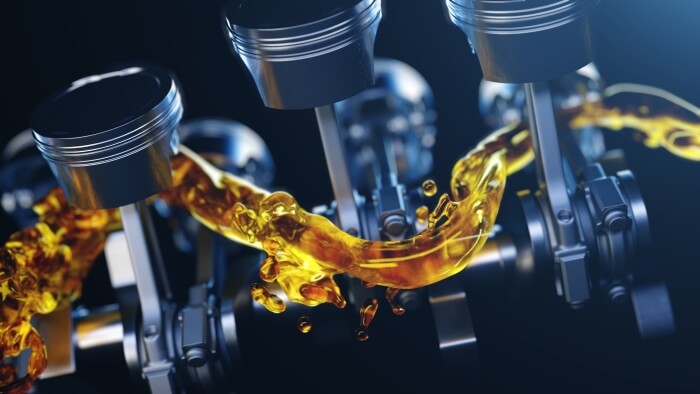


What is the function of engine oil in a combustion engine?
The main tasks of engine oil in a combustion engine are:
- Cooling: The friction of the moving parts in the engine is reduced and even heat distribution is ensured.
- Cleaning: Engine oil binds the smallest impurities such as metal parts in the engine and carries them away to the oil filter. This prevents deposits from forming in the engine.
- Wear protection: Engine oil separates the moving components from each other. This reduces wear in the engine and ensures a long service life.
- Corrosion protection: The metal surfaces in the engine are covered with a thin protective film by the oil, which reduces the effects of air or acids from the combustion process.
- Fuel saving: The efficiency of the engine increases through optimal lubrication, which reduces fuel consumption. Modern engine oils also actively contribute to emission reduction and environmental protection.

Composition of engine oils
Each engine oil is individual and adapted to specific requirements in different combustion engines. Therefore, always use only the oil that is prescribed in the manufacturer's specifications for your vehicle. In doing so, you must ensure that the oil specifications are met. A look at our Oilfinder is all it takes. If you use the wrong oil, irreparable engine damage can occur.
To ensure that the engine oils meet the requirements in a modern combustion engine, high-quality synthetic oils are mostly used as a basis for production. These are stable to ageing and temperature resistant. In order to cope with the constant load of an engine in operation, the base oils alone are not sufficient to protect the system adequately. Additives must be mixed into the base oil for it to work effectively. The proportion of additives in the base oil can be up to 20%. Additives are oil-soluble components that give the oil additional properties that it did not have before.
Additives for engine oils can be divided into groups:
| Group | Additive | Property |
| Surface-effective | Wear protection additive | Protects friction partners from contact and wear and tear |
| Surface-effective | Anti-corrosion additive | Protects metals from corrosion with a water-repellent layer |
| Surface-effective | Detergent/Dispersant | Binds deposits/dirt and guides them to the filter |
| Oil-protective | Anti-ageing additive | Protects engine oil from oxygen storage and decelerates deterioration |
| Oil-protective | Metal deactivator | Protects engine oil from catalytic processes due to abrasion of metals |
| Oil-protective | Antifoam additive | Reduces the formation of foam in the engine oil and the oxygen ingress |
| Oil-improving | Viscosity improver | Optimises viscosity in the range of limit temperatures (cold, heat) |
| Oil-improving | Pourpoint improver | Provides good lubricating properties in cold conditions |
| Oil-improving | Elastomer improver | Protects engine components with elastomers from decomposition |
Contact
